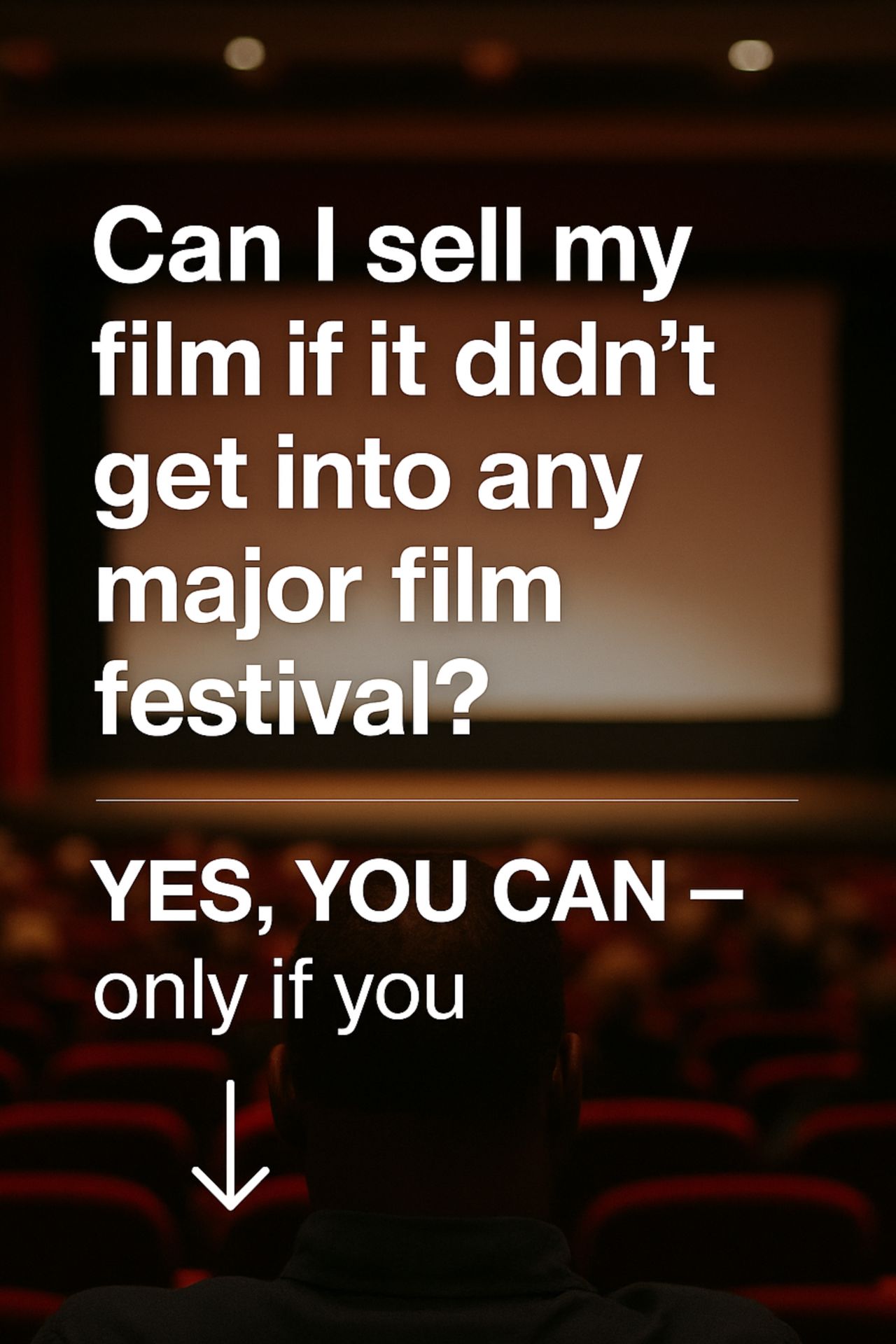
Your Film Didn’t Get Into TIFF. Can You Still Sell It? Absolutely.
Every year, thousands of filmmakers hit “submit” on their festival applications with dreams of a world premiere at TIFF, Sundance, Berlinale, or Cannes.
For many, that submission feels like a ticket to validation, the gateway to distribution, attention, and success.
But when the results come out and your name isn’t on the list, the silence can feel brutal.
I’ve seen filmmakers lose confidence, delay release plans, or even shelve their films completely after festival rejections.
And every time, I say the same thing:
You can still sell your film. You just have to stop waiting for permission.
The Festival Myth
Festivals are incredible platforms, I run two myself.
They bring exposure, critical attention, and a network effect that money can’t always buy.
But here’s the uncomfortable truth that many filmmakers don’t want to hear:
Distributors don’t buy films just because they played at a major festival.
They buy films that fit a market need, not necessarily a festival trend.
A regional broadcaster in Africa, a streaming platform in India, or a diaspora channel in Canada might have completely different audience demands than what a festival programmer in Berlin is curating for.
Your film could be too commercial for Sundance, too unconventional for TIFF, and yet perfectly positioned for a platform looking to fill a specific niche.
Why Some “Rejected” Films End Up Winning Anyway
Let’s talk examples.
The Man Who Sold His Skin — initially overlooked by several major festivals, later found a home with international distributors and earned an Oscar nomination.
Loving Vincent, the world’s first fully painted film, didn’t sweep top-tier festivals but sold to more than 130 countries because it had a clear artistic hook and global curiosity appeal.
Skin (Guy Nattiv’s short film) played smaller festivals before eventually winning an Academy Award.
In each case, the filmmakers didn’t stop at “no.” They repositioned their work around what made it unique, not what made it acceptable.
Repositioning: Your Most Underrated Superpower
When a film doesn’t make it into a top-tier festival, that’s not a verdict on quality — it’s often a matter of fit, timing, or even politics.
Here’s what you can do instead of waiting for another “maybe next year”:
- Rebrand Your Narrative
- What’s your hook? What larger conversation does your film belong to?
- For example, a film about migration can be repackaged under “stories of belonging,” “diaspora journeys,” or “climate displacement.”
Suddenly, it’s relevant to broadcasters, NGOs, and cultural institutions.
- Define Your Core Audience
- Who is this film for?
Festivals look for universal themes; distributors look for specific audiences.
If you made a film about African startups, you might pitch to business networks, diaspora media, or educational platforms — not just film festivals.
- Who is this film for?
- Identify Market-Driven Angles
- Ask: “What gap does my film fill?”
- Maybe there’s a platform struggling to find regional content with English subtitles, or short films about technology, or female-driven African stories.
Your film could be the missing piece in that catalog.
- Repackage Your Assets
- Create a new trailer focused on your strongest emotional beats.
- Refresh your synopsis with sharper positioning.
- Highlight themes that connect with today’s conversations — social impact, innovation, culture, or identity.
Distribution is About Fit, Not Fame
Let’s be honest — the market doesn’t care who clapped at your premiere.
It cares whether your film can capture attention, retain it, and serve a specific audience.
Here’s how the thinking differs:
| Festival World | Distribution World |
|---|---|
| Seeks artistic excellence | Seeks audience engagement |
| Rewards innovation and craft | Rewards watchability and market fit |
| Prioritizes prestige | Prioritizes performance |
So if your film didn’t make TIFF, Sundance, or Berlinale, it doesn’t mean it failed — it just means it wasn’t built for their agenda.
You might have made a market film, not a festival film — and that’s perfectly okay.
Finding Your Alternative Path
There are dozens of legitimate routes to get your film seen, sold, or syndicated:
- Niche Streaming Platforms: Tubi, Plex, Mansa, AfroLandTV, KweliTV, and Showmax are all seeking curated content beyond the festival radar.
- Educational Distribution: Universities and libraries pay for films that align with curriculum themes (migration, social justice, environmental change, etc.).
- Airlines and Hotels: In-flight entertainment platforms constantly need global, short-form, or human-interest content.
- Direct-to-Community Screenings: Host small premieres in cultural centers, art houses, or embassies — record the impact, and use it as leverage for buyers.
You can even partner with regional distributors, like Filmdows Entertainment, that specialize in getting underrepresented films into global circulation.
The Mindset Shift
The biggest shift you can make as a filmmaker is this:
Stop thinking like an applicant.
Start thinking like a strategist.
Because festivals are not gatekeepers — they are one of many gateways.
Your job isn’t just to make a film; it’s to position it.
To tell the story of your story.
To decide where your film belongs — and then walk it there confidently.
Rejection doesn’t define your trajectory — response does.
The truth is, your film might not be TIFF-ready…
but it might be sale-ready.
And that’s a different kind of win — one that pays you back in ownership, opportunity, and long-term visibility.
So if the festival doors didn’t open this year, don’t wait at the gate.
Build your own entrance.
Because in today’s world, the most powerful distribution deal begins with one decision —
to stop waiting for permission, and start positioning your story.
Written by Michael Osheku
Creative Director | Film Sales & Distribution Strategist | CreativeTech Entrepreneur
